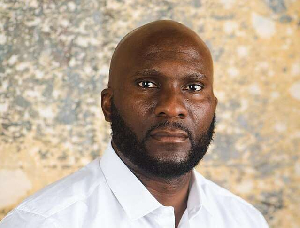Brain drain is simply defined as “the emigration of highly trained or intelligent people from a particular country.”
At the recent launching of the Ghanaian-Canadian Chamber of Commerce (GCCC) cum the Diaspora Engagement Think Tank (D.E.T.T.) by the Ghanaian-Canadian Association of Ontario (GCAO) in Toronto, the Canadian Federal Minister of Immigration, Refugees and Citizenship, Hon. Ahmed Hussen (born and raised in Somalia and came to Canada as a refugee at the age of 16 years in 1993) said that Canada welcomes immigrants from other parts of the world who come here to study.
He continued, “such immigrants after their studies stay back in the country and contribute hugely to the socio-economic as well as political development of Canada!” How true! One can cite the Honorable Minister as a ‘brain drain’ to Africa.
But wait a minute! Could this successful African in Canada also be a ‘brain gain’ to Africa? Yes! He is already the National President of the Canadian Somali Congress, which “works to promote the development of friendly and mutually beneficial relations between Canada and Somalia as well as assisting the Somali people in building a peaceful, united, independent and democratic Somali state.” What a give-back to Somalia and Africa as a whole!
This bring to the fore the argument that those of us who have left the shores of our motherland, Ghana, with our expertise and skills to other parts of the world are considered ONLY as ‘brain drain’ to Ghana. I contend here that such argument is defeated with the fact that Ghanaians in Diaspora give back to Ghana as a ‘brain gain’ and even in some circumstances as ‘brain circulation’ in the world! Let us take for example Dr. Isaac Odame of the Toronto Sick Kids Hospital in Canada and Dr. Oheneba Boachie-Adjei of the Foundation of Orthopaedics and Complex Spine (FOCOS) based in New York, USA.
Dr. Odame, a Ghanaian pediatrician working in Toronto (far away from his motherland, Ghana) is giving back to Ghana by bringing Ghanaian nurses to Toronto to learn more about caring for kids in hospital and return to Ghana with their skills gained in Canada to help hospitals in the motherland. Dr. Odame recently at the launching of the GCCC cum DETT by GCAO in Toronto made the following comment: “how well we treat infants and children is an indicator of growth a country.” I couldn’t agree with him the more!
FOCOS’s mission is to provide comprehensive, affordable orthopaedic care to those who would not otherwise have access to such treatment. FOCOS’s founder has established a modern hospital in Ghana which provides spine or orthopaedic care to patients in West Africa and beyond.
It is reported that, “FOCOS has operations in the United States and Ghana. Its US operations provide funding and operational support to our Orthopedic Hospital, an ultra-modern 50-bed specialty facility providing services to adult and pediatric patients in need of orthopaedic care. Specializing in complex spine and joint replacement surgeries, the FOCOS Hospital is fully accredited to operate both inpatient and outpatient departments.”
What is brain drain? Any Advantages?
According to Cervantes, Mario; Guellec, Dominique (January 2002), the term "brain drain" was coined by the Royal Society to describe the emigration of "scientists and technologists" to North America from post-war Europe. Another source indicates that this term was first used in the United Kingdom to describe the influx of Indian scientists and engineers. There are also other relevant phrases, "brain circulation" and "brain waste". Although the term originally referred to technology workers leaving a nation, the meaning has broadened into "the departure of educated or professional people from one country, economic sector, or field for another, usually for better pay or living conditions".
"Brain-drain? is a phenomenon where, relative to the remaining population, a substantial number of more educated (numerate, literate) persons emigrate.
Research suggests that migration (both low-and high-skilled) is beneficial both to the receiving and sending countries. According to one study, welfare increases in both types of countries: "welfare impact of observed levels of migration is substantial, at about 5% to 10% for the main receiving countries and about 10% in countries with large incoming remittances"-di Giovanni, Julian; Levchenko, Andrei A.; Ortega, Francesc (1 February 2015). A Global View of Cross-Border Migration, Journal of the European Economic Association.
I must point out that besides the huge remittances that immigrants send back home knowledge and skills transfer is also important to both the receiving and sending countries. One of such areas is the education sector where Ghanaians professors and teachers abroad engage in research work and/or ‘sabbatical’ lectures in colleges and universities in Africa to the gain of the lecturers as well as the students. Some Ghanaian educationists are also involved in students’ exchange programs between learning institutions in the Western World and Ghana
“Brain Drain” results in “Brain Gain”?
It is worth noting here that more often than not, there is a "brain gain" instead of a "brain drain" to emigration. One study finds that sending countries benefit indirectly in the long-run on the emigration of skilled workers because those skilled workers are able to innovate more in developed countries, which the sending countries are able to benefit on as a positive externality.
Some Ghanaian professionals and skilled workers in diaspora are giving back to Ghana and Africa in what could be termed as BRAIN CIRCULATION as in the case of Dr. Odame of Canada and Dr. Boachie-Adjei of USA to mention just a few.
Opinions of Friday, 4 August 2017
Columnist: Joe Kingsley Eyiah, OCT, Brookview M. S., Toronto-Canada















